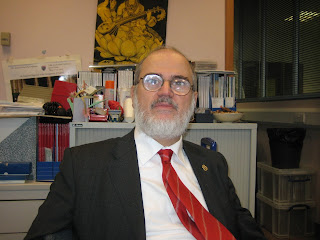 It seems appropriate that our first profile for the Informa Pharmaceutical Science blog should feature Dr. Dimitri P. Mikhailidis. Dimitri is currently Editor-In-Chief of four journals published by Informa Pharmaceutical Science: Expert Opinion on Investigational Drugs, Expert Opinion on Therapeutic Targets, Expert Opinion on Pharmacotherapy, and Current Medical Research and Opinion. Beyond Dimitri's editorial role, he has been an author on numerous original research articles, reviews, and editorials, with over 60 published articles in Expert Opinion and CMRO since 2000. Lest we give the impression that Dimitri favours our journals over others click here to see his 600+ Pubmed listings.
It seems appropriate that our first profile for the Informa Pharmaceutical Science blog should feature Dr. Dimitri P. Mikhailidis. Dimitri is currently Editor-In-Chief of four journals published by Informa Pharmaceutical Science: Expert Opinion on Investigational Drugs, Expert Opinion on Therapeutic Targets, Expert Opinion on Pharmacotherapy, and Current Medical Research and Opinion. Beyond Dimitri's editorial role, he has been an author on numerous original research articles, reviews, and editorials, with over 60 published articles in Expert Opinion and CMRO since 2000. Lest we give the impression that Dimitri favours our journals over others click here to see his 600+ Pubmed listings.Dimitri is currently the Academic Head & Honorary Consultant to the Department of Clinical Biochemistry at the Royal Free University College Medical School, University College London, and he holds Visiting Professor positions at Robert Gordon University (Scotland) and University of Ioannina Medical School (Greece). Dimitri has travelled widely to present his research, having lectured in 40 countries around the world. Beyond the editorial posts he holds with the Informa Pharmaceutical Science journals, Dimitri is also Editor-in-Chief of four other medical journals, and holds other editorial positions with several more. And sometimes, apparently, he eats and sleeps, although we have no empirical evidence to support this claim.
Research by Dimitri and his network of collaborators primarily focuses on treatment and prevention of cardiovascular disease, and Dimitri was awarded the British Medical Association (BMA) award for vascular research in 1995. His articles cover a broad spectrum of topics: many are written with an eye towards utility for current clinicians, some cast needed attention on new promising therapies in the drug development pipeline, while still others focus on future directions for research in cardiovascular disease. A notable recent paper published in EOP, authored by Dimitri and his colleague Martin Press from the Royal Free Hospital, reviewed the importance of targeting multiple risk factors, including both traditional and novel cardiometabolic factors, in the prevention of cardiovascular events in patients with type 2 diabetes (available for free download). In another recent publication, an editorial commentary in the March 2008 issue of CMRO, Dimitri and his colleagues present an interesting discussion on how age affects how cholesterol levels can and should be used to predict vascular risk and the implications for elderly patients (available for free download).
Dimitri's most recent article, an editorial in CMRO, is likely to create some waves in the cardiovascular community. The editorial focuses on the growing controversy over the potential danger of abruptly stopping statin use in high-risk patients. Instead of giving away the punchline, read the paper for free here.